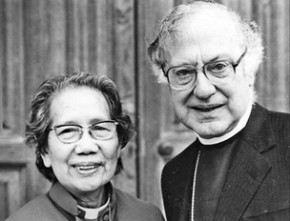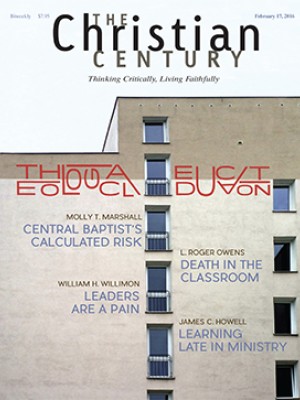Florence Li, much beloved

Last month marked the 72nd anniversary of one of the great events in modern church history (though one that attracted little notice at the time). On January 25, 1944, an English-born bishop consecrated a Chinese woman to the Anglican priesthood.
To understand just how radical a step that was, consider that it would be another 30 years before women attained that rank in the Episcopal Church in the United States, and not until the 1990s were women ordained as priests in the Church of England.
Read our latest issue or browse back issues.
Even had she not been a priest, the woman at the heart of the story, Florence Li Tim-Oi, deserves to be remembered as a potent symbol of Chinese Christianity during the 20th century.
Florence Li was born in the village of Aberdeen, Hong Kong, in 1907, and that curious mix of names—Scottish and Chinese—captures the cultural intermingling and border crossing that ran through her life. Although born in a society that did not welcome baby girls, her schoolmaster father gave her the name Tim-Oi, “Much Beloved.” When she was baptized in her twenties, she took the name of the Victorian nurse Florence Nightingale, who enjoyed something like sanctity in the Anglican world of the time. The name also recalled the floral character of her birth month of May in Chinese tradition. In 1931, inspired by witnessing the ordination of an English deaconess, she determined to pursue theological studies in Guangzhou (Canton).
Beginning in the late 1930s, China suffered an extremely bloody and oppressive Japanese invasion and occupation, and the British colony of Hong Kong fell in 1941. As a colony of neutral Portugal, the city of Macau enjoyed some immunity, although it was overwhelmed by hundreds of thousands of refugees. The humanitarian crisis posed enormous pastoral difficulties for the tiny number of Anglican clergy and lay leaders in the area, and travel from Hong Kong was next to impossible. In 1942, although still only a deacon, Florence Li was unofficially presiding at Holy Communion for a congregation in the city, some 300 strong.
At that point, she reached out to the bishop of Victoria (Hong Kong), who faced a difficult decision. This bishop was Ronald Hall, a much-decorated World War I hero, who in the 1920s began a lifelong love affair with China and its people. Florence Li’s temporary situation troubled him greatly.
As a high churchman, Bishop Hall venerated church tradition, which offered no warrant for ordaining women under any circumstances. Yet as an Anglo-Catholic, he believed that the Eucharist was absolutely essential to Christian life, and this could only be delivered by properly ordained priests. Without priests and the Eucharist, the nascent Chinese church would wither and die. He was also clearly impressed by Florence Li’s personal qualities, her evident courage and resourcefulness. Both bishop and deacon had to undertake days of perilous travel to meet for the ordination ceremony.
The ordination caused major grief to church authorities. It was condemned by two successive archbishops of Canterbury, and the 1948 Lambeth Conference decreed that the women’s ordination issue was now closed for debate.
Despite this response, Bishop Hall refused to revoke Florence Li’s ordination. He faced renewed pressure as the war had ended, when he could no longer justify his decision as a temporary emergency measure. She agreed to renounce the license that allowed her to operate as a priest, although she never abandoned her ordination. She then moved to China’s far south, near the Vietnamese border, where she ran a maternity home established partly to prevent the common practice of female infanticide.
In 1949, China’s fall to Maoist communism meant that Florence Li was forced to renounce public expressions of her faith, although she continued to work privately. Persecutions reached new heights in the horrific excesses of the Cultural Revolution in the decade following 1966, when the government allowed bands of thugs to terrorize anyone who could be associated, however implausibly, with prerevolutionary or pro-Western ideas.
At the worst point of this national calamity, a glimmer of hope emerged in church life. In 1971, the Anglican province of Hong Kong and Macau became the first in that whole communion to ordain women, which meant that Florence Li’s ordination was acknowledged once more. However small the Anglican presence was in the spectrum of Chinese Christianity, this was a weighty symbolic statement. China’s liberalization eventually allowed Florence Li to leave the country for Canada, where in 1983 she became an honorary priest in Toronto. She died in 1992. In 2003, the Episcopal Church commemorated her ordination in its list of Lesser Feasts and Fasts.
Church historians often remark how often mission frontiers give rise to innovations and creative experiments that ultimately return to shape the Christian mainstream. Today the main problem in discussing Florence Li’s ordination is explaining to anyone under 40 why such a move was ever thought controversial.






